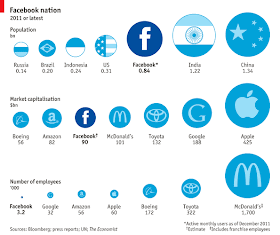
In this context, John Gapper has an interesting op-ed in FT where he questions the rationale behind Facebook's decision to go public. The company's free cash flow rose from $190m to $470m between 2010 and 2011, while its shareholders’ equity increased from $2.2bn to $4.9bn, leaving it with no immediate need for any additional capital.
It intends to put the cash into US government bonds and savings accounts, and perhaps use some to pay the tax due on converting into shares the "restricted stock units" it has given to its 3,200 staff... Its sole tangible purpose for the IPO proceeds is to meet a tax obligation that will be triggered by going public. Welcome to the Catch-22 world of the venture capital liquidity event...
Apart from meeting US regulations for a private company to go public when it gains more than 500 investors, Facebook’s motivation is clear: to gratify its venture capital investors and employees... a quote from Mr Zuckerberg’s letter to new shareholders, "We’re going public for our employees and our investors... We made a commitment to them when we gave them equity that we’d work hard to make it worth a lot and make it liquid, and this IPO is fulfilling our commitment".
In terms of Silicon Valley’s logic, it makes sense. The returns from occasional winners such as Facebook make up for venture capitalists’ losing bets on thousands of other start-ups – provided the winners are sold either to other companies or to the public markets.
No comments:
Post a Comment